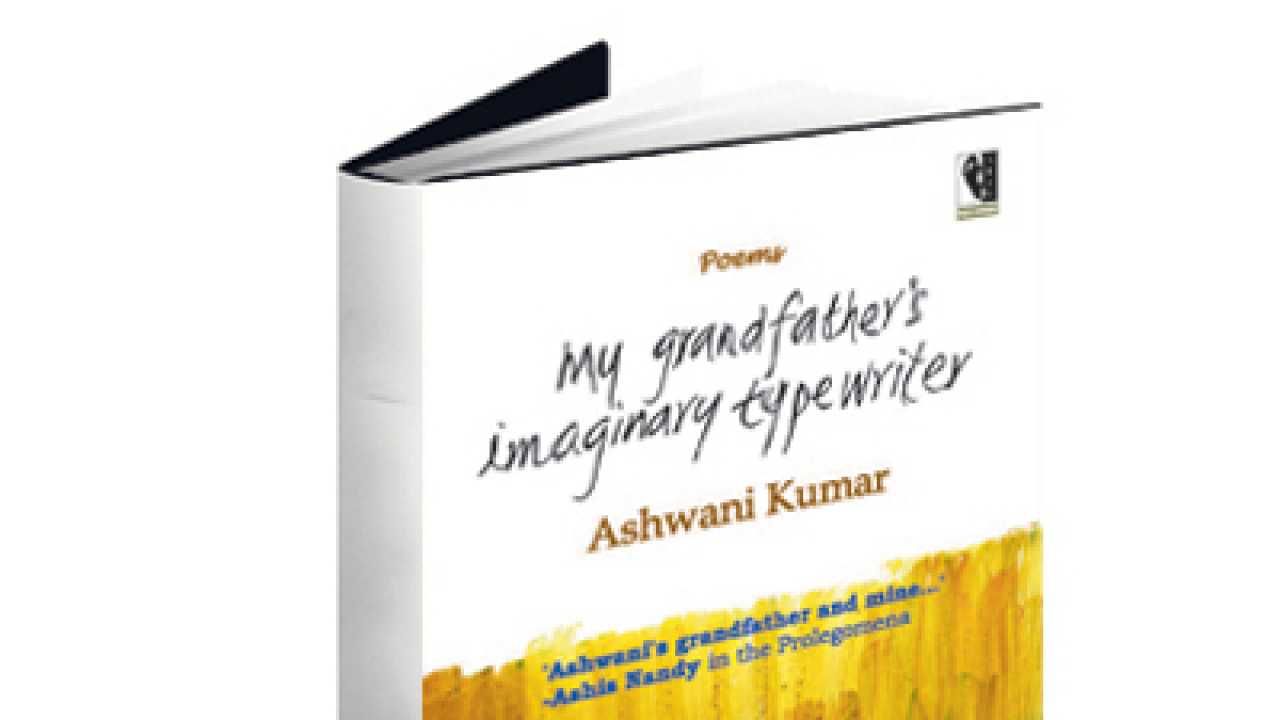
Book: MY GRANDFATHER’S IMAGINARY TYPEWRITER
Author: Ashwani Kumar
Publisher: Yeti Books
Pages: 96
Price: Rs399
'Born amidst neither pleasure nor fear/ I came to the world like unwashed blue jeans/At the serpentine box office queues of morning shows/ adult fantasies play hide-and seek like nursery kids/ The last drop of alcohol in the whisky bottle/ dances adulterously on my million tongues/ The fragrance of your armpit/ travels like gunpowder in the dark forest.'
—In Lieu of a Birth Certificate
A quality of whimsy unites the 86 poems in this slim collection, an attribute they have in common with their creator, Ashwani Kumar, professor at the Centre for Public Policy Habitat and Human Development at Tata Institute of Social Sciences (TISS) Mumbai and member of several important government committees (MGNREGA and the like). This is Kumar's first book — though several individual poems have appeared before in literary journals. A second, containing longer, elegiac poems running into several pages, will come out in six months. Kumar is also working on a book in prose.
The volume's fittingly fanciful title, My Grandfather's Imaginary Typewriter, is taken from prolegomena (meaning a prologue that works as a critical introduction to a treatise) by eminent sociologist Ashis Nandi. In it, Nandi tells a delightful story about how he thinks the "poet sleeping peacefully" in Kumar had been awakened by the spectre of a typewriter that once belonged to his grandfather. Apparently, Kumar's grandfather had a "writing machine" — a rarity in those days — which he showed Nandi's grandfather, a notorious river pirate. The latter had been so enchanted that he simply ran away with it. Unfortunately, every time Nandi's grandfather tried to show it to others, including his wife, they could not see it!
For Kumar, poetry is far more than just words arranged in a pleasing rhythm to tell some "truth" — it's more a manifesto for revolution, an idea that goes back as far back as Shelley, who described poets as the "unacknowledged legislators of the world".
"The power of poetry is the power of the powerlessness. The power of prose is the power of the power. This is why I write poetry," says Kumar, shaking his shaggy salt-and-pepper locks that make him look more like a savant than a much-in-demand academic-technocrat. "Poetry is the best place I could do my politics, rather than what I find on the streets. In a way, it is going back, recovering those memories that humanise us and also dehumanise us."
Indeed, Kumar manages to pack into his poetry some really subversive ideas. In Waking Early in Ayodhya, Kumar juxtaposes the demolition of the Babri Masjid with an entirely imaginary scene — Rama having a one-night stand with the wife of a deserted saint (Ahalya?) whom he'd seduced, "in the kitchen of his divine consort".
"He spreads his teflon-coated legs/ Bends his artificial arrow/ She quivers, moans in ecstasy/ They mate all day shamelessly/ And the bricks of the mosque fall; screaming/ With each fatal stroke."
Strange that this verse, published in the March-April 2006 issue of Indian Literature, should not attract the kind of angry reactions that far more innocuous things (the movie PK for instance) have. Kumar is unapologetic. "In those moments that writers call 'stream of consciousness', I discover that Rama had many consorts. This is my imagination. I am unfortunately taught by one of the great disciples of AK Ramanujan, Vinay Dharwadker. I have some remote connection with Ramanujan and have benefited from his poems and iconoclastic way of looking at Rama." Namdeo Dhasal, Muktibodh, Paash, Sahir Ludhianvi, Safdar Hashmi and Gulzar are others.
Ironically, Ramanujan's essay 300 Ramayanas, which looks at the many tellings and re-tellings of the epic — some of them blaspheming against the "Rama as god" view held up by the politically ascendant Hindutva parties, didn't have such luck and was banned from the Delhi University syllabus in 2011.
Not all of Kumar's poems speak of weighty subjects. There are other sparkling ones on more 'poetic' subjects like love and marriage. "Air affluent, dreams on diet/ Stakes are too high/ I can't buy grocery, I can't cook/ Will you marry me?" goes one titled, "Will you marry me?"
This is the future, Kumar exults, he is looking at — one "where family, love, marriage are up for renewal". Anyway, says Kumar, in the rough and tumble of the times we live in, all relationships and institutions and labels are in a continual state of flux, of negotiation. These, he says "are irrelevant to me as a poet". Perhaps, whimsy is the only way they can be liberated into some form of "truth".